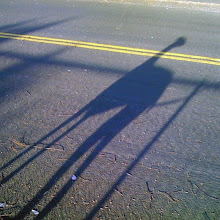Something about reading reviews of
Match Point* (which I have not yet seen, but how could that stop me from having an opinion?) led me to a revelation--Woody Allen is to film as Elvis Costello is to music. I cherish both, but to be honest prefer their earlier, better work, which is kind of funny. While Allen has a decade on Costello, both began taking fringier attitude to more normal forms to begin their careers, as Allen burned through genres (prison film, sex film, sci-fi, war epic) and Costello just burned, but not so much that he didn't have a Huey Lewis-less News be his backing band on album #1. Both share a problem that Allen's more obvious forefather Groucho suffered from--an excess of wise-ass wit, and tongues that don't know when to stop, so that while neither lacked lust, they're so lackluster, both as artistic personae lacked those who lusted them back, at least for long (despite Allen's actual carrying on with his co-stars and Costello finally pegging a Pogue, at least for awhile). Both were/are dependent on a brilliant colorist sidekick--in Allen's case cinematographer Gordon Willis, who made Manhattan as beautiful as it will ever be, and in Costello's, Steve Nieve, possessing fingers as busy and spry as his boss' lexicon.
And both built to one youngish man's masterpiece each, something that kept enough of their early energy but added just enough of some wisdom to be works that they could never match again. For Allen it was
Manhattan, a notch better than
Annie Hall because while just as funny it's a bit more serious (even moreso in retrospect to learn Allen himself can't get over the girl-child thing that whether he means to or not is kind of creepy in his alter ego Isaac Davis--I mean, just look at his pleading to Tracy in that last scene, and how much his eyes know the lie to the line he wrote for her, "Not everyone gets corrupted"). And thanks to Gordon Willis, and amazing black and white, one of the most gorgeous bits of celluloid you can watch, from the glory of NYC to the lunar surface in the Hayden Planitarium to Meryl Streep who would never look lovelier.
For Costello it was
Imperial Bedroom, a quiet record with his noisiest guitar, if only to establish he's a man out of time. Really, though, it's
Wee Small Hours for post-punks, with melodies so luscious they seem edible. That's where all the busted love earns its burnished sheen, and how fitting that the disc's most Sinatra-esque song "Almost Blue" would be later be one of the last great recordings by Chet Baker, another monument to wasted loveliness.
Sure, they've both had their moments since then, but at that point it all comes down to squabbling. You might like
Crimes and Misdemeanors, and I might find it's morality play too schematic (even saying there's no justice can be too pat). I might say
Zelig and you might complain it's a stunt in search of a throughline. Of course you'd be wrong, it's way too touching for that while still being a parable for the 20th century; god knows they took this quick film and bloated into
Forest Glop.
You might say
King of America, and I might say I love "American without Tears" and "Brilliant Mistake," but otherwise it is too stately for me. I might say
Blood and Chocolate, but that's partially because for my money "I Want You" is
Last Tango in Paris in song, or at least what happened to me 12 years ago in song, if only I was that generous and inarticulate.
No one is going to say
The Curse of the Jade Scorpion, or
Alice, or
Goodbye Cruel World, or
Mighty Like a Rose. If we want mediocrity, we can turn to Barry Sonnenfeld or solo Paul Carrack. And we don't want grandiosity either, so let's admit
Interiors was a huge mistake. Don't get me wrong, I like Bergman, but faux-Bergman might as well be Bill & Ted--it turns parody, whether meant or not, really fast. And while Allen has his Bergman, Costello has his Brodsky Quartet.
Well, even if their careers have seemed to peter out, even though each new film or release gets some critic to trumpet "the old Woody/Elvis is back," about the only thing we can be sure of is both married women no one would have guessed they could end up with back in 1977. Of course, Soon-Yi was only seven at the time, and that might even make Jerry Lee Lewis blush.
*If you're going to remake
An American Tragedy, again, you got to have someone go wild with an oar in the courtroom like Raymond Burr. You know Hitchock watched that and a couple of years later when he had to cast Lars Thorwald, knew who to call.









